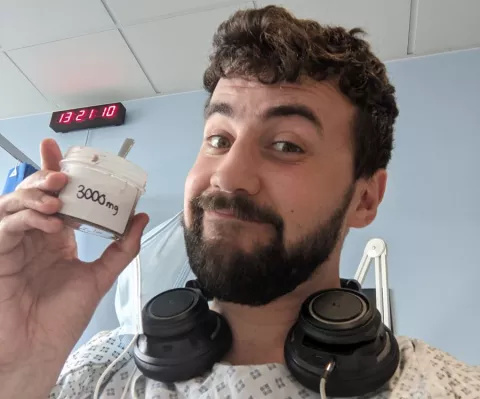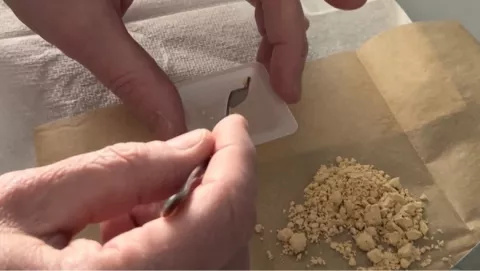Daily peanuts help adults reduce allergy
Thursday 24 April 2025

Chris took part in the trial
Adults who have a peanut allergy can reduce their sensitivity to peanuts so they no longer become life threatening, a clinical trial has shown.
In the first study of its kind on adults with severe allergies, two-thirds of participants could eat the equivalent of 5 peanuts by the end, according to the findings published in the journal Allergy.
The results from this preliminary study are potentially transformational for people with serious peanut allergies. The findings need to be confirmed in larger trials.
The Grown Up Peanut Immunotherapy (GUPI) trial tested whether daily doses of peanuts taken under strict supervision can be tolerated in adults with severe allergies. Immunotherapy has been used successfully in babies and children, but this is the first time that it has been used in a trial on an all-adult group.
The joint research between Guy’s and St Thomas’ and King’s College London was funded by the National Institute for Health and Care Research.
Chris Brookes-Smith is one of the people who successfully took part in the trial, and can now eat 4 peanuts a day when he previously worried that he might die by accidentally eating part of a peanut.
Chris, a 28-year-old cybersecurity specialist from Northamptonshire, was diagnosed with a peanut allergy as a baby. He said: “I’m so proud to have been part of this trial and so happy to say that I used to be allergic to peanuts but thanks to this trial, this is no longer a concern.
“Me and my family were always anxious that even a trace of peanut could be life-threatening. The trial was an interesting experience because all of my life I had associated the taste and smell of peanuts with fear and death.
“I started with a small amount of peanut flour with yoghurt. Now, I have 4 peanuts every day with my breakfast to maintain my immunity.
Before, a tiny mistake could have life-threatening impacts but now I don’t have the fear that I might collapse and die from eating a takeaway.
The Phase II trial recruited 21 adults aged 18 to 40 with a clinical diagnosis of peanut allergy at Guy’s and St Thomas’.

The trial took place at Guy's Hospital
In hospital, participants received the first dose of 0.8mg peanut protein in flour mixed with food, with the amount gradually increased. Those who tolerated it, continued to take doses at home and returned to hospital every 2 weeks for dose increases. If they could tolerate 50-100mg of peanut protein, they were switched to eating actual peanut, peanut butter or products containing peanut, with the first dose being under supervision of the clinical team.
Once participants achieved a daily dose of 1g they remained on this dose for at least 4 weeks before undergoing a food challenge. This involved being given increasing doses of either peanut or placebo (dummy food) on separate days under close supervision to test their tolerance. Participants then continued daily dosing for at least 3 months.
Results showed that 67% of people taking part were able to consume at least 1.4g peanut protein – the equivalent of five peanuts – without reacting. They could then eat peanuts every day at home to remain desensitised.
Hannah Hunter, specialist allergy dietitian at Guy’s and St Thomas’, was lead author of the study.

Hannah Hunter, dietitian
Hannah said: “Living with peanut allergy is a huge burden due to the need for constant vigilance and the risk of accidental exposures. Everyday situations such as eating in restaurants and social events are anxiety provoking and our patients tell us that the condition also affects travel choices and career options.
“We found that quality of life significantly improved after oral immunotherapy and fear of food also decreased. Many participants who completed the trial told us that the treatment had been life-changing and they were no longer living in fear.”
Dr Kok Loong Ue, consultant allergist at Guy’s and St Thomas’, said: “We’re grateful to those who took part in this trial, as it is a high-risk treatment, requiring multiple hospital visits and close supervision from our specialist team. It has been very rewarding to see first-hand the difference it has made to the lives of Chris and other participants.”
Chief Investigator of the study Professor Stephen Till, professor of allergy at King’s College London, said: “Constant fear of life-threatening reactions places a huge burden on people with peanut allergy. The only way to manage a peanut allergy is strict avoidance and treatment of allergic reactions, including with adrenaline.
“We are very pleased with the results of this study. The next stage of the research will be confirming this in larger trials identifying the group of adult patients who would most likely benefit from oral immunotherapy, and seeing whether it can lead to long-term tolerance in this age group.”
Public Health Minister, Ashley Dalton said: “This groundbreaking research offers hope to thousands living with peanut allergies. For too long, people have navigated daily life in fear of accidental exposure that could be life-threatening.
"I'm proud the UK is leading this vital work through NIHR funding. These results show how we're transforming lives through science, potentially changing care standards for adults with peanut allergies worldwide.”
Professor Lucy Chappell, Chief Scientific Adviser at the Department of Health and Social Care (DHSC) and Chief Executive Officer of the NIHR said: “These results mark an important milestone in allergy treatment and offers new hope to adults living with peanut allergies. The NIHR Research for Patient Benefit Programme funds research that has a direct impact on improving patient outcomes. For adults who have long lived with the daily burden and fear of accidental exposure they may have a pathway toward greater safety and an improved quality of life.”
Last updated: April 2025
Contact us
If you're a journalist and have a media enquiry, please contact us.
Phone: 020 7188 5577
Email: [email protected]